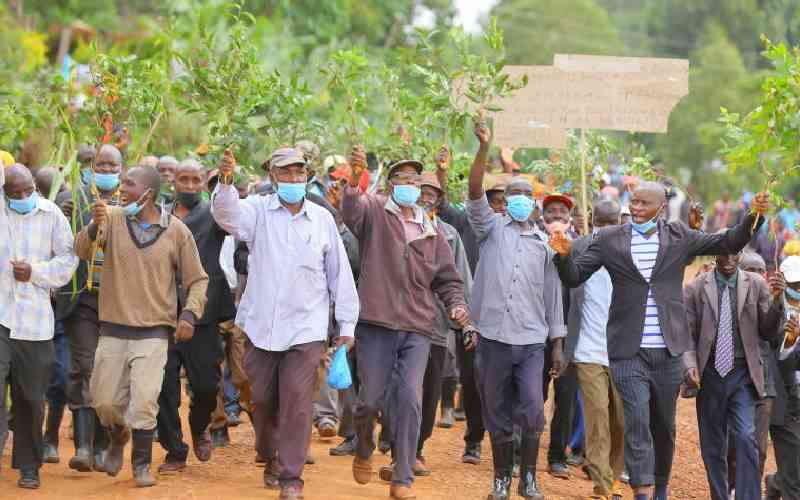
NAIROBI, KENYA: Kenya's crude could be priced higher than oil produced by some Arab states.
The Financial Standard can exclusively report that Kenya's crude grade ranks among the best in the world. This is according to preliminary tests carried by the Ministry of Energy and Petroleum and the companies that have been exploring oil in Turkana.
According to Ministry of Energy officials, preliminary oil tests by Government show it has low sulphur content and density, which means is sweet and light. The two – density and sulphur content – are among the key quality measures for crude.
It usually results in crude classified as light or heavy according to density, and sweet or sour depending on its sulphur content. Premium crude oils are usually light and sweet.
Tullow Oil, which has also tested the oil separately, said Kenyan crude is of high quality. It is likely to fetch a premium price once it hits the market.
A Ministry of Energy official, who declined to be named because he is not authorised to speak on behalf of the Government said Kenya's crude oil is almost akin to Brent crude, highly rated oil from UK's North Sea, which is a blend of 15 different crude oils from the area. This is in comparison to its sulphur content and density.
Crude oil density is measured using the American Petroleum Institute (API) Gravity Standard, whereby oil with an API of over 30 degrees Fahrenheit are light while those with an API of 20 degrees or less are considered heavy and cost more to extract and refine. Oils with high sulphur content, usually over 0.5 per cent of the total weight, are considered sour and anything less than 0.5 per cent being considered sweet.
Kenyan oil has an API Gravity of between 25 and 38 degrees according to the preliminary tests. Its sulphur content falls within the under 0.5 per cent level - making it light and sweet. According to sources, some wells at the Lokichar Basin have a sulphur content of below 0.1 per cent, making oil from these wells among the sweetest in the world.
The oil from the Lokichar Basin compares favourably to the best crude oil in the world, which is produced in Libya with API gravity ranging between 32 and 44 degrees and sulphur content of as low as 0.07 per cent. The only other crude that beats Libya is Malaysian oil.
It is also in comparison to Brent crude, which has an API of 38 degrees and a sulphur content of 0.37 per cent. Brent is the second most popular benchmark after the American West Texas Intermediate, which has an API of 39.6 degrees and a sulphur content of 0.24 per cent. Dubai crude – which is however not a representative of all Middle Eastern Crude Oils due to the many different grades in the region – has an API of 31 degrees and sulphur content of two per cent.
The flipside however is that the Kenyan oil is waxy with a high pour point. It stops flowing at fairly low temperatures, meaning it would need heated transport and storage facilities.
The Ministry of Energy official explained that waxiness is not necessarily a major issue of concern, and occurs in both light and heavy crude oil. Light sweet crude oil are easier and cheaper to process. The oil also flows to the surface and remains in a fluid state but solidifies when moved to areas where temperatures are lower than those in Turkana.
Tullow and Africa Oil have in their earlier disclosures to investors said the Kenyan crude is of high quality, with oil from some of the wells having an API Gravity of up to 38 degrees. The firm confirmed to the Financial Standard that tests it has carried out so far show Kenyan crude to be of high quality.
"The crude oil is sweet – it does not have sulphur. It is also a little heavy also known as waxy. The crude oil is of good quality according to Tullow's tests," said Timothy Tororey Communications Manager Tullow Oil, Kenya BV.
Tullow has already produced 60,000 barrels of oil that is currently held in storage tanks at Lokichar. These will be among the first barrels that will be trucked to Mombasa under the early oil production programme.

Light and sweet crude tends to fetch higher prices in the market because it is easier and cheaper to refine. They also yield more petroleum products per barrel compared to heavy sour crude.
Brent crude and the West Texas Intermediate (WTI) crude oil – produced in North America – are the major crude oil benchmarks in the world. WTI crude costs slightly more than the Brent Blend as it is lighter and sweeter. The two rank higher than oil from Middle Eastern oil fields.
According to the United States' Energy Information Administration (EIA), crude oils that are light (have a lower density) and sweet (have low sulphur content) are usually priced higher than heavy, sour crude oils.
"This is partly because gasoline (super petrol) and diesel fuel, which typically sell at a significant premium to residual fuel oil and other 'bottom of the barrel' products, can usually be more easily and cheaply produced using light, sweet crude oil. The light sweet grades are desirable because they can be processed with far less sophisticated and energy-intensive processes or refineries," said an analysis by EIA.
While bullish about the high quality of its oil, and even the quantities that further drilling and testing might reveal, the Government has been cagey with the details about the quality of the oil find.
Energy and Petroleum Cabinet Secretary Charles Keter said tests undertaken are yet to pinpoint the exact grade of Kenyan oil, noting that the Ministry and Tullow are still undertaking further tests to ascertain its nature.
"At the moment, we are still carrying out tests and we cannot yet say whether it is like Murban or Brent. The early oil programme will enable us ascertain the quality of our oil. The pilot will also enable us to see how the market reacts to the crude, which will inform the full field development," he said.
He observed that the Government and the joint venture partners prospecting for oil in Turkana – Tullow Oil, Africa Oil and Maersk Oil – are yet to decide on the buyers or a refining destination for oil or the export markets to sell crude.
He however said a number of Chinese and Indian refineries have already shown interest in handling the Kenyan oil. The refining destination is also likely to inform the export market.
Kenya also has the option of selling the oil at Mombasa and from then on, it will be the responsibility of the buyer to source for a refinery and a market once the crude has been refined. "There are companies that have already shown interest from China and India but we have not yet made a decision," said Keter.
A Ministry of Energy report published in October 2016 noted that because of its waxy nature, the Kenyan crude oil flows at temperatures above 63 degrees centigrade. This is in comparison to Brent crude that has a low pour point of - 42 degrees.
"The crude oil in the Lokichar Basin is waxy and is characterised by high pour point and a wax appearance temperature above 63 degrees centigrade. The Project will thus involve construction of a heated pipeline from Lokichar to Lamu," said the draft report.
Due to the waxy nature and heating requirements, transportation of Kenyan crude will be a complex affair, particularly during the early oil pilot scheme when the movement will be by trucks.
Charles Wanguhu coordinator Kenya Civil Society Platform on Oil and Gas noted that these will increase production costs and might impact on the prices of the products in the market. He observes that while some variants of crude from Middle East are heavy and sour, the process of recovering them is usually fairly easy, which might not be the case for the Kenyan oil.
Tullow however notes that the wax in crude oil is common among many oil blends and having heated facilities might not necessarily mean higher processing costs and that there is technology today to ensure crude is extracted, stored and moved cost effectively.
"The crude is waxy but this is not new in the oil industry. Many other countries have waxy crude and use the same kind of technology to extract, transport and store it," said Tororey.
"The surface facilities such as tanks will need to have a capacity for heating. The Early Oil Pilot Scheme will give us more information about the crude oil behaviour. Kenyan crude will not be costlier. High processing cost is caused by presence of sulphur and our crude oil does not have sulphur."
The Government has set $43 (about Ksh4,300) per barrel as a breakeven price for its pilot programme that is set to commence June. Keter notes that with the current prices at over $50 (Ksh5,000) per barrel, while it may not fetch the country money from sales, the pilot scheme will be able to pay for itself.
"When we started on the early oil pilot programme, there were a lot of questions on whether we would make any money. The cost per barrel was about $30 and our calculation, our breakeven would have been $43 and now the prices are over $50 per barrel which means that we can recoup investments," said Keter.
The Government has also set aside Ksh2 billion in the 2017/2018 Budget for LPG Exploration and Distribution and KSh3.84 billion for exploration and distribution of oil and gas, largely in line with what was budgeted in the prior year.
Key initiatives to undertaken in the new financial year include the delivery of 480,000 barrels of crude oil to the Mombasa refinery terminal for export under the Early Oil Pilot Scheme (EOPS).
EOPS is expected to provide experiential learning to assist in full field development planning, and to test the market before a $2.1 billion pipeline of about 855 kilometres is built.
EOPS will see Turkana Crude transported via road using heated 20-feet containers. It is estimated that the round trip will take three days with 30 trucks being loaded daily. Analysts say this lengthy and complicated procedure, which is estimated to go on for three years, will draw heavy expenditure at probably no profit.
But the Ministry says these are logistics that we have to pay in the short-term for long-term gains, adding that keeping the crude oil in storage facilities will still be costly.
 The Standard Group Plc is a multi-media organization with investments in media
platforms spanning newspaper print operations, television, radio broadcasting,
digital and online services. The Standard Group is recognized as a leading
multi-media house in Kenya with a key influence in matters of national and
international interest.
The Standard Group Plc is a multi-media organization with investments in media
platforms spanning newspaper print operations, television, radio broadcasting,
digital and online services. The Standard Group is recognized as a leading
multi-media house in Kenya with a key influence in matters of national and
international interest.
 The Standard Group Plc is a multi-media organization with investments in media
platforms spanning newspaper print operations, television, radio broadcasting,
digital and online services. The Standard Group is recognized as a leading
multi-media house in Kenya with a key influence in matters of national and
international interest.
The Standard Group Plc is a multi-media organization with investments in media
platforms spanning newspaper print operations, television, radio broadcasting,
digital and online services. The Standard Group is recognized as a leading
multi-media house in Kenya with a key influence in matters of national and
international interest.











